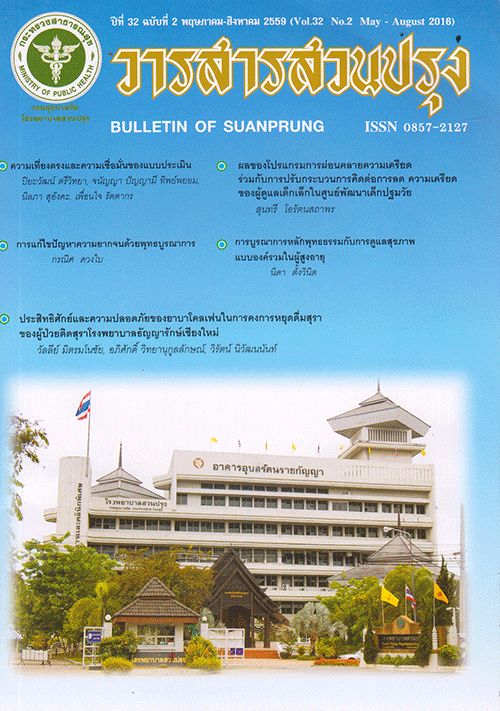การบูรณาการหลักพุทธธรรมกับการดูแลสุขภาพแบบองค์รวมในผู้สูงอายุ (Integration of the Buddha Dhamma Principles and Holistic Health Care of the Elderlies)
Main Article Content
Abstract
วัตถุประสงค์ เพื่อบูรณาการหลักพุทธธรรมกับการดูแลสุขภาพแบบองค์รวมในผู้สูงอายุ
วัสดุและวิธีการ วิธีดำเนินการวิจัย โดยทำการศึกษาใน ๒ระดับ คือ การศึกษาจากเอกสาร (Documentary research) และการศึกษาในภาคสนาม (Field research) รวบรวมข้อมูลชั้นปฐมภูมิ (Primary Sources)จากพระไตรปิฎกอรรถกถา ข้อมูลชั้นทุติยภูมิ (Secondary Sources) จากหนังสือ ตำรา เอกสารทางวิชาการ และงานวิจัยที่เกี่ยว ข้องทั้งในภาษาไทยและภาษาต่างประเทศ การสังเกตแบบมีส่วนร่วม (Participant Observation) มีประชากรกลุ่มตัวอย่างคือผู้สูงอายุเพศหญิงและชายที่ศูนย์บริการผู้สูงอายุ ปิยะมาลย์ สังกัดศูนย์พัฒนา การจัดสวัสดิการและสังคมผู้สูงอายุบ้านธรรมปกรณ์ ต.วัดเกตุ อ.เมือง จ.เชียงใหม่ จำนวน 12 ท่าน
ผลการศึกษา หลักพุทธธรรมกับการดูแลสุขภาพแบบองค์รวมมีความเชื่อมโยงกันอย่างเป็นรูปธรรมการดูแลสุขภาพผู้สูงอายุให้สมบูรณ์ทั้ง 4 มิตินั้น สามารถนำหลักพุทธธรรมมาประยุกต์ใช้กล่าวคือ มิติทางกายต้องมีความเข้าใจหลักอริยสัจ4 หลักไตรลักษณ์ ปรับเปลี่ยนกระบวนทัศน์ผู้สูงอายุด้านจิตวิญญาณ และต้องรักษาศีลมิให้ด่างพร้อย มิติทางใจและปัญญาต้องเติมเต็มให้สมบูรณ์ให้ได้มากที่สุดด้วยหลักโพธิปักขิยธรรม 37 ส่วน มิติทางสังคมต้องเอื้อหนุนสภาวะแวดล้อมด้วยหลักพรหมวิหาร 4 และสังคหวัตถุ 4 ซึ่งหลักธรรมดังกล่าวนั้นหากมองโดยรวมแล้วสามารถย่อเป็นหลักไตรสิกขา คือ ศีล สมาธิ และปัญญา ซึ่งก็คือการดูแลสุขภาพทางกายและใจ เพื่อการเข้าใจที่ดี ในการดูแลสุขภาพของผู้สูงอายุ ผู้วิจัยนำเสนอเป็นกาพย์ยานี ใน “NIDA’S MODEL 8/7 ประการ” และเมื่อทุกมิติ-ทางกาย ทางใจ และปัญญาดีแล้วย่อมจะส่งผลต่อมิติทางสังคมที่ดีตามมา
สรุป หลัก 8/7 ประการ หรือ NIDA’S MODEL เป็นการบูรณาการหลักพุทธธรรมกับการดูแลสุขภาพแบบองค์รวมในการดูแลสุขภาพผู้สูงอายุ
Objective To integrate the Buddhist Dhamma Principles and Holistic health Care of the elderlies
Materials and Methods The research was conducted by using two methods, i.e. Documentary Research and Field Research. Primary sources were derived from the Buddhist Canon and its Commentaries,while secondary sources were extracted from relevant researches and academic papers in both Thai and foreign languages. The studied framework of this study was participant’s observation. The populations were composed by 12 elderlies who stay at the Piyaman Aging Services Center under the Thammapakorn Social and Welfare Development Center, Watket Sub district, Muang District, in Chiang Mai province.
Results According to the Buddha Dhamma and the holistic health Care , it is substantial to relate the elderly health care in 4 dimensions and the Buddha Dhamma can be applied for the physical dimension. That is to say, the elderly should understand the Four Noble Truths and the Three Characteristics. In the spiritual dimension, they should change their attitude and observe the Five Precepts. In the mental or intellectual dimension, they should fulfill the principle of Bodhipakkhiya-dhamma 37: virtues partaking of enlightenment. In the social dimension, they should practice Brahmavihàra 4 or the sublime states of mind and Sangahavatthu 4 or bases of social solidarity. The Brahmavihàra and Sangahavatthu can be summarized as the morality, concentration and wisdom, which are considered as the physical and mental health care. For the best understanding of the elderly health care, the researcher has proposed a poem that appeared in the NIDA’S MODEL 8/7. When all dimensions-the physical, mental and intellectual are well cared, it will affect the social dimension as well.
Summary The Principle 8/7 or the NIDA’S MODEL is the integration of Buddha Dhamma principles and the holistic health Care into the elderly’s health care.
Article Details
บทความหลังผ่านการปรับแก้จากกองบรรณาธิการแล้ว เป็นลิขสิทธ์ของวารสารจิตเวชวิทยาสาร โรงพยาบาลสวนปรุง กรมสุขภาพจิต กระทรวงสาธารณสุข ห้ามเผยแพร่เพื่อประโยชน์ทางการค้าโดยไม่ได้รับอนุญาต แต่อนุญาตให้เผยแพร่บทความดังกล่าวเพื่อประโยชน์ทางการศึกษาแก่ประชาชนทั่วไป ทั้งนี้กองบรรณาธิการไม่จำเป็นต้องเห็นด้วยกับบทความหรือข้อคิดเห็นใดๆ ที่ปรากฏในวารสารสวนปรุง
References
Foundation of Thai Gerontology Research and Development institute (TGRI), Situation of Thai Elderly 2006. Bangkok: n.p. [2000 Oct 12]
Krob krua kao, TV 3 Chanel. Thailand dominating the elderly in ASEAN [online]. www.krobkruakao.com [2014 Feb1] (in Thai)
Phra Dhammapidok (P.A. Payutto). The Longevity and its Value. Bangkok: Thammasapha, n.d. (in Thai)
Sangha Supreme Council of Thailand. National Office of Buddhism. Buddha's Stanza Chant for the Congratulatory and Contribute to a Royal Charity Dedicated to His majesty the King. Bangkok: National Office of Buddhism; 2011. (in Thai)
Mahachulalongkornrajavidayalaya. Tipitaka in Thai version, MCU Version. Bangkok: MCU Printing House; 1996. (in Thai)
Phra Brahmagunabhom (P.A Payutto). Dictionary of Buddhism. Bangkok: n.d.;2008.p.73. (in Thai)
Khemthong P. Self-care behavior of the working age in Nakhonnayok Province [dissertation]. Bangkok: Ramkhamheang University; 1996. (in Thai)
Young G. Health is a state of complete physical, mental and social well-being not merely the absence of disease or infirmity; 2003. (in Thai)
Phra Brahmagunaborn (P.A. Payutto). Buddhist Holistic Health. Buddhacakka 2015;59(11): 5-10. (in Thai)
Why Hatred Important? [online]. Available from: URL: http://www.bloggang.com.Orison SwettMarden.mainblog.pp?id=century&month=01-082006&group=13&gblog=8 [2015 Dec 22].
Vajirananavarorasa. Navakovada: instruction of newly ordained Bhikkhu. Bangkok: Maha Makuta Buddhist University; 1997. (in Thai)
Kiatkajorntada C. Narrative from human body. Bangkok: Sai Thurakit Printing House; 2015. (in Thai)
Disayavanich C. Psychology of the extinction of suffering. Bangkok: Tonboon print; 2011. (in Thai)
Intasara W. The Buddha’s admonition before attained nibbana. Bangkok: Aim graphic house; 2013. (in Thai)
The Chanting Book of the Mind Development Centre Glorify the King Rama IX, Wat Rampoeng (Tapotaram). Chiang Mai: Chang Puek Printing House; 2014. [in Thai]
Chavetchasath V. Health Care Guide. Bangkok: Book Time; 2007. (in Thai)
108 Ways of Taking Care Your Heart. Klai Mor Magazine. 2006. (in Thai)
Health Care by Holistic Medicine [online]. Available from: URL:
http://www.jobpub.com/articles/ showarticle.asp?id=2326 [2015 Dec 22].

